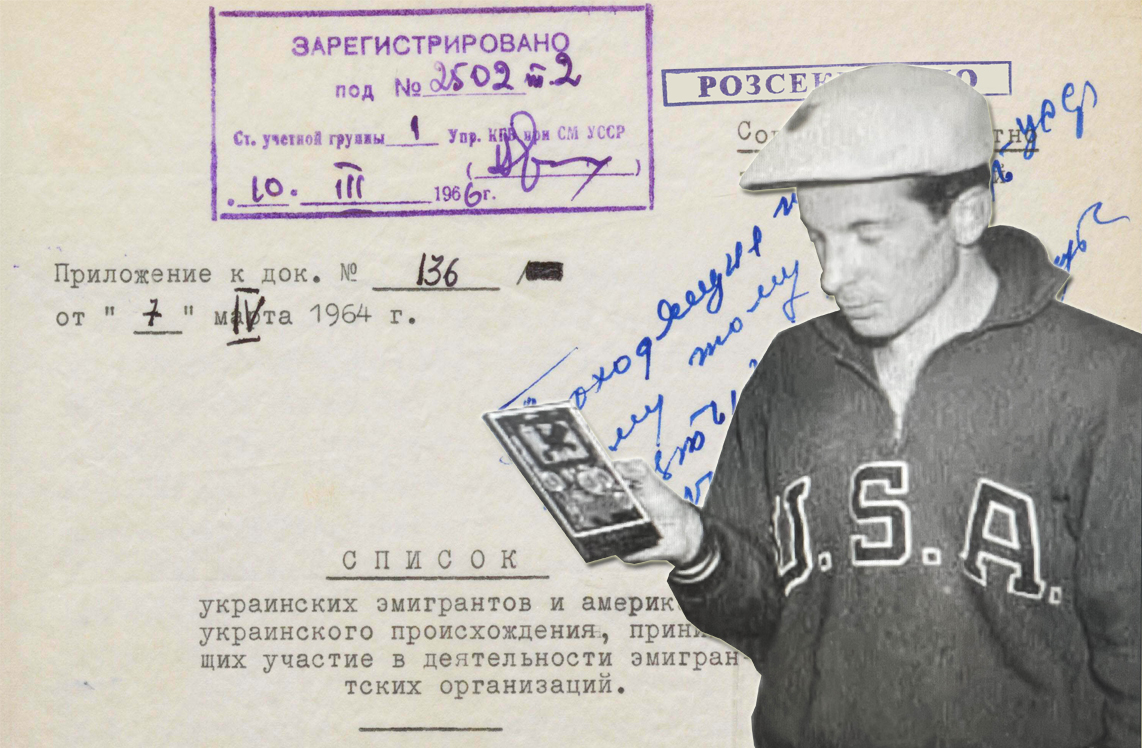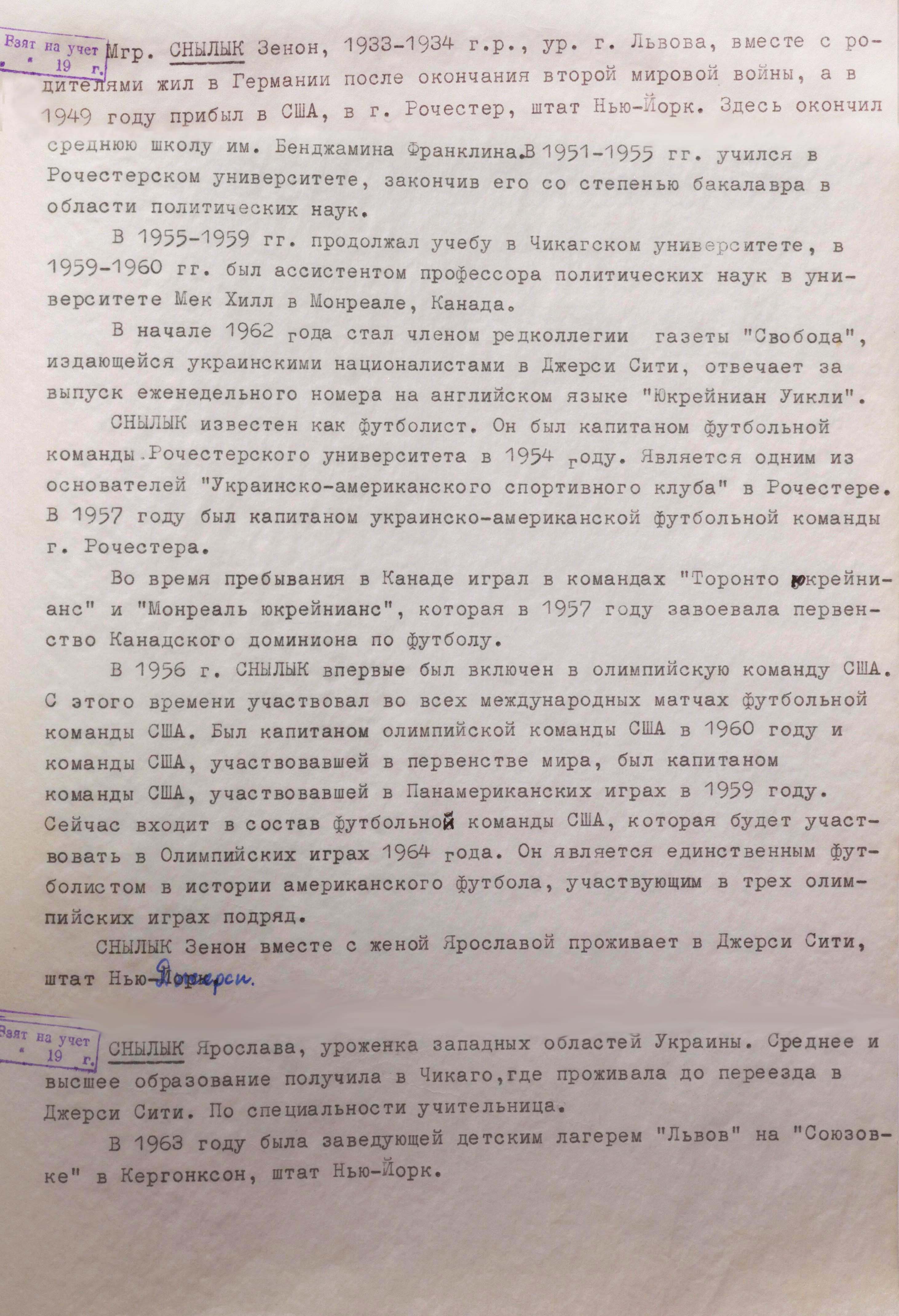Zenon Snylyk. Participant of Three Olympics
8/3/2024

The archives of the Foreign Intelligence Service of Ukraine contain lists of US residents who had Ukrainian roots and could be of operational interest to the kgb. Among them were many members of emigrant organizations, US military, scientists, creative intellectuals, engineers and technicians who had proven themselves in promising industries, and others. Zenon Snylyk was also included in the list for his special achievements in sports – as the only player in the history of soccer (football – Transl.) in the United States to have played in three consecutive Olympic Games.
The 319-page document is entitled “The List of Ukrainian Emigrants and Americans of Ukrainian Descent Participating in Emigrant Organizations”. It states the following about Z. Snylyk:
“Zenon Snylyk, born in 1933 or 1934, a native of Lviv, lived with his parents in Germany after World War II, and in 1949 arrived in the United States, in Rochester, New York. Here he graduated from the Benjamin Franklin High School.
In 1951–1955 he studied at the University of Rochester, graduating with a bachelor's degree in political science. In 1955–1959, he continued his studies at the University of Chicago, and in 1959–1960 Snylyk was an Assistant Professor of political science at the McGill University in Montreal, Canada.
In early 1962, he became a member of the editorial board of the newspaper “Svoboda”, published by Ukrainian nationalists in Jersey City, and was responsible for the weekly English-language issue of the “Ukrainian Weekly”.
At the same time, contemporary publications, including the “Svoboda” newspaper and a number of sports publications, reveal that Z. Snylyk was born on November 14, 1933, in the village of Putiatyntsi, Rohatyn district, in what is now Ivano-Frankivsk region. During the Second World War, he lived with his family in Lviv. He played in the youth team of the football club “Ukraine”. Later the family left for Germany. There he was a player of the “Lions” Plast team and the Ukrainian team “Prometheus”, as well as the Bavarian youth team. At the same time, he played table tennis and was considered one of the best in that sport in Germany. He completed his secondary education at a Ukrainian gymnasium in a camp for displaced persons.
The document from the intelligence archives pays more attention to Z. Snylyk's soccer career. It says that “he was the captain of the University of Rochester soccer team in 1954. He is one of the founders of the Ukrainian American Sports Club in Rochester. During his stay in Canada, he played for the “Toronto Ukrainians” and the “Montreal Ukrainians”, which won the Canadian Dominion soccer championship in 1957. In 1956, Snylyk became a member of the US Olympic team for the first time. Since then, he has participated in all international matches of the US soccer team. He was the captain of the US Olympic team in 1960 and the US team at the World Cup, and was the captain of the US team at the Pan American Games in 1959. He is currently a member of the US soccer team that will participate in the 1964 Olympic Games. He is the only soccer player in the history of American soccer to have played in three consecutive Olympic Games” (BSA of the SZR of Ukraine. – F.1. – Case 14487. – V.2. – P.253–254).
This document dates back to 1964. Therefore, it could not contain information about Z. Snylyk's further sports and journalistic career. The list of his sporting achievements is also incomplete. It is now known that in the 1950s he plaid in the New York State soccer team and the national team of US universities, and was the best American college soccer player. He was selected for the US national team to participate in the 1954 World Cup, but did not play a match against Mexico because he did not have a passport. He became the champion of Canada as a member of the “Ukraine” team (Montreal) and a bronze medalist at the 1959 Pan American Games. He received invitations from “Wiener Athletik” (Vienna, Austria) and German “Stuttgart”, which he declined due to his father's illness. Until 1970, he had been playing for the “Chornomorska Sich” (“The Black Sea Sich” – Transl.) team, and ended his soccer career at the age of 37.
Apart from sports competitions, Z. Snylyk was engaged in journalistic, scientific, and public activities. In particular, he taught for some time at the School of Ukrainian Studies in Chicago, was a translator and member of the editorial board of the Encyclopedia of Ukrainian Studies in 1963–1971, and from 1980 to 1998 was the editor of the “Svoboda” newspaper, and a member of the Shevchenko Scientific Society in the United States. He died in Berkeley Heights, USA, on January 21, 2002.
Despite the fact that the information found in the intelligence archives is incomplete and partially inaccurate, the very fact that the kgb was interested in Z. Snylyk shows that soviet special services at that time were collecting information on Ukrainians abroad.
Such lists were usually compiled on the basis of information collected by employees of foreign residenturas of the kgb, embassies, consular and other institutions. Individuals were considered both as an object for operational cultivation and as a potential danger in case of any confrontation in the future. Having accumulated a certain amount of materials, they could start an operational collection or a case file. In this case, they had to plan certain measures for additional study of the object of interest.
As for Z. Snylyk, the case did not go further than drawing up a paper with general information. Although the editing of such a well-known newspaper as “Svoboda” could have been the basis for something more serious. But there were not always operational opportunities for this. Thus, Zenon Snylyk managed to avoid soviet secret services’ closer attention. He was registered only for operational purposes, like many others, as evidenced by the stamp in the paper next to his name.

